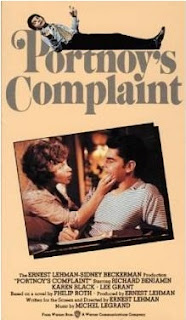Portnoy's Complaint (1972)
When Philip Roth's Portnoy's Complaint was published in 1969, it created a furor. It was the first mainstream book to discuss things like masturbation and cunnilingus. One of the chapters was titled "Cunt Crazy." It is my favorite book, and I've read it three times.
The inevitable film version, directed by the great screenwriter Ernest Lehman, fizzled. Released in 1972, it pretty much sank into oblivion, and there seems to be no home video version of it. I have to thank the soon to be departed Filmstruck for allowing me a chance to see it.
Books that are basically internal monologues are tough to film. Technically, Portnoy, a young Jewish man working at the mayor's office in New York, is telling his tale to his psychiatrist, Spielvogel. He reminisces about living with his impossible parents and jerking off whenever he gets a chance. His lowest moment is when he use a piece of liver that the family later ate. "I fucked the family dinner," he says.
The plot of the book is pretty thin, and the film is mostly plot. Portnoy meets what he thinks is his ideal woman, a fashion model from West Virginia nicknamed the Monkey. He propositions her on a street corner--first he offers to buy her a drink, and when she rebuffs him he says, "How I about I eat your pussy?" (in the book, it was cunt). "That's more like it," she says.
Roth, not exactly a creator of nuanced women, makes the Monkey something of a monstrosity, and Karen Black's performance carries that out. She's sexy and a nympho but she's also bonkers, and pointedly, she can't spell. Portnoy (played very well by Richard Benjamin) eventually dumps her, and tries to seduce an Israeli woman (Jill Clayburgh, in one of her first film performances). That doesn't go so well.
The book is really about his relationship with his mother. She's played by Lee Grant, and we get some of the stereotypical Jewish mother behavior. But Portnoy's horror at/attraction to his mother is almost Oedipal. This is left out of the film, and it's the worse for it.
Some scenes are right out of the book, such as a visit to an easy Italian girl who gives Portnoy a handjob and when he comes it hits him in the eye (that is mentioned, not shown). But they leave out such great moments as when he hits the light bulb in the bathroom and his semen sizzles, or when he says, after numerous rounds of onanism, "When will I come blood?"
The film also leaves out the last line, in which Spielvogel says, after two hundred pages of monologue, "Perhaps now vee begin?" Instead, Spielvogel is silent, and the film ends anticlimactically.
The inevitable film version, directed by the great screenwriter Ernest Lehman, fizzled. Released in 1972, it pretty much sank into oblivion, and there seems to be no home video version of it. I have to thank the soon to be departed Filmstruck for allowing me a chance to see it.
Books that are basically internal monologues are tough to film. Technically, Portnoy, a young Jewish man working at the mayor's office in New York, is telling his tale to his psychiatrist, Spielvogel. He reminisces about living with his impossible parents and jerking off whenever he gets a chance. His lowest moment is when he use a piece of liver that the family later ate. "I fucked the family dinner," he says.
The plot of the book is pretty thin, and the film is mostly plot. Portnoy meets what he thinks is his ideal woman, a fashion model from West Virginia nicknamed the Monkey. He propositions her on a street corner--first he offers to buy her a drink, and when she rebuffs him he says, "How I about I eat your pussy?" (in the book, it was cunt). "That's more like it," she says.
Roth, not exactly a creator of nuanced women, makes the Monkey something of a monstrosity, and Karen Black's performance carries that out. She's sexy and a nympho but she's also bonkers, and pointedly, she can't spell. Portnoy (played very well by Richard Benjamin) eventually dumps her, and tries to seduce an Israeli woman (Jill Clayburgh, in one of her first film performances). That doesn't go so well.
The book is really about his relationship with his mother. She's played by Lee Grant, and we get some of the stereotypical Jewish mother behavior. But Portnoy's horror at/attraction to his mother is almost Oedipal. This is left out of the film, and it's the worse for it.
Some scenes are right out of the book, such as a visit to an easy Italian girl who gives Portnoy a handjob and when he comes it hits him in the eye (that is mentioned, not shown). But they leave out such great moments as when he hits the light bulb in the bathroom and his semen sizzles, or when he says, after numerous rounds of onanism, "When will I come blood?"
The film also leaves out the last line, in which Spielvogel says, after two hundred pages of monologue, "Perhaps now vee begin?" Instead, Spielvogel is silent, and the film ends anticlimactically.



Comments
Post a Comment